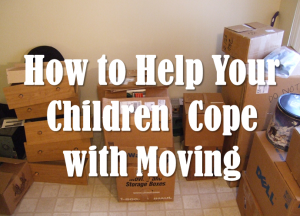I’M BAAAACK! For all of those who were wondering where I disappeared to, my family has been super busy moving. It’s been a long few months, but we’re getting settled. In light of our recent move with two small children, I decided to shed some light on maintaining friendships and how to break the news to your kids.
How to Help Your Children Cope with Moving and How to Maintain Long Distance Friendships
Packing up and moving your family to a new place can be an overwhelming experience, especially for the kids – I know because I moved around…a lot. Whether you met in grade school, high school, college, or some other time in life – the chances are high that physical distance has come between you and some of your closet friends. Some people find it difficult enough to maintain friendships with people in the same town. So how are these people supposed to survive hundreds, if not thousands, of miles between them to stay close friends?
As adults and parents, we ask ourselves if it’s possible to maintain long distance friendships, but what about our children’s relationships? Yes. It is possible. Meredith and I have been best friends for over 20 years, and we haven’t lived in the same place for 18 years. Thanks to our parents, we were given the opportunity to learn the difficult art of nourishing our friendship over a long distance. If your family, or a close family friend, are moving away, here is the secret to helping your child maintain their friendships separated by time and physical space.
Breaking the News
I will never forget when my parents broke the news to my sister and I that we were moving to Greece at the end of the school year. At the time, we were living in Singapore, a small, thriving country located in Southeast Asia. As we had been attending the American School there for three years, our family was accustomed to traveling back and forth to the States to visit family and friends every summer and winter break.
Being part of the military, my family was part of a close and safe community in Singapore, and we were comfortable. I met my best friend, Meredith, in kindergarten the previous year, and our parents became close friends and spent a lot of time together. When my parents told us that we were moving, Charlie, my sister, and I had two very different reactions. Remember, kids thrive on familiarity and routine. When your family decides to move, relocating to a new place can be a traumatic experience, and may be hard for your kids to understand at first.
Gently break the news to your kids six to eight months in advance prior to the moving day. This will give them ample time to process and prepare for the upcoming life change.
Dealing with Reactions
Your children will respond emotionally to the news, and that’s a good thing. They will display a mix of emotions from sad, mad, and lonely to anxious, excited, and eager over the next few months. Don’t try to talk them out of what they’re feeling. Instead, address and validate their emotions, and allow your children to emote about the unfairness of it all.
Acknowledge your children’s concerns and feelings by being with them when they cry, scream, worry, or when they become excited about moving. This exemplifies to them of your support. Instead of your kids isolating themselves from your before, during, and after the moving process, create a safe environment and ask them what you can do to make their transition easier. Reiterate to yourself and to your kids that the family will benefit from moving, and will give each of you more outlets to grow, change, and express themselves successfully.
Staying Connected
When moving day finally arrived, I remember feeling excited and sad at the same time. My increased play dates and time spent with Meredith only strengthened our bond, solidifying us as best friends for the rest of our lives. As a rising second grader moving to Greece with her family, my parents were sure to collect all of Meredith’s information needed in order to stay in touch.
- Contact Information: To maintain close friendships after the move, it is a requirement that you, as the parent, make the necessary effort to keep your children’s friendships strong and connected to one another.
- Time Difference: Depending on your family’s new location, identify the time difference and new time zone to prevent contacting friends at inconvenient times.
- Commit: Like all relationships, friendships require both parties to make a commitment to each other. If you’re not willing to make the effort to stay connected with someone whom you care about from the beginning, then the chances of the two of you maintaining a friendship significantly decreases.
- Digital Connections: Thanks to modern day technology, there are a variety of ways to stay in touch with each other. Social media platforms, such as WhatsApp, Facebook, and Twitter to name a few, are perfect solutions to staying connected with each other. The better the friend, the more variety in their efforts to stay involved in your life.
- Take Notes: When talking to each other on the phone, you will need to work extra hard to remember what your friend is doing and saying. So take notes by writing it down in a notebook. Remembering the details and people’s names is a great way to show your friend that you care, you are paying attention, and you’re still a part of their life.
- Annual Trips: Talk to the parents of your child’s best friend and try and plan an annual trip to see each other. There’s nothing better than spending quality face time with your best friend. It gives your child something to look forward to every year, allowing them to nourish their friendships. Take a lot of pictures to capture memories in the making.
- Snail Mail: There’s something special about hand written letters, post cards, mixed CDs, and – of course – stamps. Staying connected and in touch with each other is easy, but to keep your friendship unique and personal, invest the time to disconnect from technology and reconnect by sending each other pictures, letters, cards – your options are limitless. Encourage your child to be creative, they’ll thank you when they are older – I promise.
- Bad Days: As your child gets older, encourage them to confide and connect with their best friend. Reassure them that just because they are in a long distance friendship, they don’t need to only share the good news. When they experience something bad, tell them to lean on their friend – that’s what friends are there for. Great friends are present during the good and bad days; help maintain their long distance friendship.
- Accept Change: Don’t expect your child’s friendships to be the same once they’ve moved, but reassure them that even though they do not live in the same place, their friendship is still there, and always will be for as long as they want it to be.
- Be Honest: Promote to your children to keep lines of communication with their long distance friendships open as much as possible. Not only will it encourage the bond to deepen, it will prevent any resentment from festering and building between them as the years pass.
Helping your child maintain long distance relationships with their friends requires a conscious effort. Thanks to our parents, Meredith and I have managed to stay best friends throughout the years despite the distance between us. As we got older, nourishing our friendship became second nature; a reassuring security that saved us. Flash forward 23 years, Meredith and I finally live in the same city, raising our children together; our friendship couldn’t be stronger. It’s very rare to cultivate and nurture a long distance friendship, but if you are willing to do it, it’s not impossible and it is completely worth it.
So now that our move is done, I’ll be back to posting regularly here… I’ve missed you all!
Peace, love, and health,



